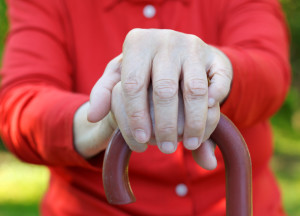Written by Greg Arnold, DC, CSCS. Collagen supplementation significantly improved measures of pain, stiffness, and physical function in participating subjects.
 Osteoarthritis, which entails the destruction of joint cartilage and remodeling of the adjacent bone, is the most common form of arthritis, affecting more than 25 million Americans 1. Current therapies for osteoarthritis include prescription and over-the-counter medications, as well as joint injections of corticosteroids or hyaluronic acid to relieve severe pain 2,3. However, their ability to halt the progress of osteoarthritis is “limited” 4.
Osteoarthritis, which entails the destruction of joint cartilage and remodeling of the adjacent bone, is the most common form of arthritis, affecting more than 25 million Americans 1. Current therapies for osteoarthritis include prescription and over-the-counter medications, as well as joint injections of corticosteroids or hyaluronic acid to relieve severe pain 2,3. However, their ability to halt the progress of osteoarthritis is “limited” 4.
A 2016 randomized, placebo-controlled , double-blind study 5 involved 164 men and women between the ages of 51 and 54. Fifty-four subjects received 40 milligram of UC-ll, an undenatured type II collagen derived from chicken sternum; 57 subjects received 1500 milligrams of glucosamine and 1,200 milligrams of chondroitin; and 53 subjects received a placebo. Before and after 6 months of supplementation (180 days) each subject completed a WOMAC questionnaire about their arthritis symptoms along with a measure of overall function (Lequesne Functional Index), and completed a visual analog scale for pain.
At day 180, the UC-ll group demonstrated a significant reduction in overall WOMAC score compared to placebo (p=0.002) and GC (p=0.04).
When compared to placebo and glucosamine chondroitin, supplementation with UC-ll also resulted in significant changes in all three WOMAC subscales of pain, stiffness, and physical function:
- Pain (p = 0.0003 vs. placebo; p = 0.016 vs. GC);
- Stiffness (p = 0.004 vs. placebo; p=0.044 vs. GC);
- Physical function (p = 0.007 vs. placebo).
For the researchers, undenatured type II collagen “Significantly improved knee function in arthritis subjects by day 180 compared to placebo and to glucosamine and chondroitin and was well-tolerated”. They added that “additional research is warranted both to confirm and to define these findings more extensively.”
Source: Lugo et al. Efficacy and tolerability of an undenatured type II collagen supplement in modulating knee osteoarthritis symptoms: a multicenter randomized, double-blind,placebo-controlled study. Nutrition Journal (2016) 15:14; DOI 10.1186/s12937-016-0130-8
© 2016 Lugo et al. Creative Commons Attribution 4.0 International License (http://creativecommons.org/licenses/by/4.0/)
Click here to read the full text study.
Posted March 20, 2017.
Greg Arnold is a Chiropractic Physician practicing in Hauppauge, NY. You can contact Dr. Arnold directly by emailing him at PitchingDoc@msn.com or visiting his web site at www.PitchingDoc.com.
References:
- Lawrence RC, Felson DT, Helmick CG, et al. Estimates of the prevalence of arthritis and other rheumatic conditions in the United States: Part II. Arthritis & Rheumatism. 2008;58(1):26-35.
- Hochberg MC, Altman RD, April KT, et al. American College of Rheumatology 2012 recommendations for the use of nonpharmacologic and pharmacologic therapies in osteoarthritis of the hand, hip, and knee. Arthritis care & research. 2012;64(4):465-474.
- (NICE) NIfHaCE. Osteoarthritis: Care and Management. 2014; Guidelines for assessing and managing osteoarthritis in adults. Available at: https://www.nice.org.uk/guidance/cg177. Accessed February 27, 2017, 2017.
- Hunter DJ. Pharmacologic therapy for osteoarthritis—the era of disease modification. Nature Reviews Rheumatology. 2011;7(1):13-22.
- Lugo JP, Saiyed ZM, Lane NE. Efficacy and tolerability of an undenatured type II collagen supplement in modulating knee osteoarthritis symptoms: a multicenter randomized, double-blind, placebo-controlled study. Nutrition journal. 2016;15(1):14.
